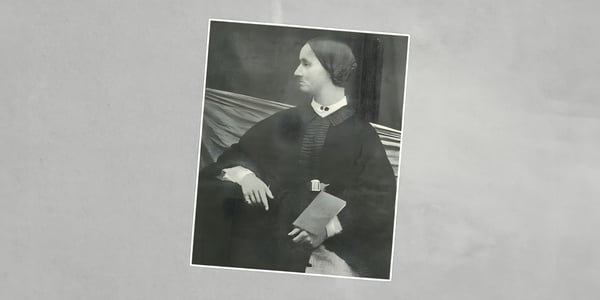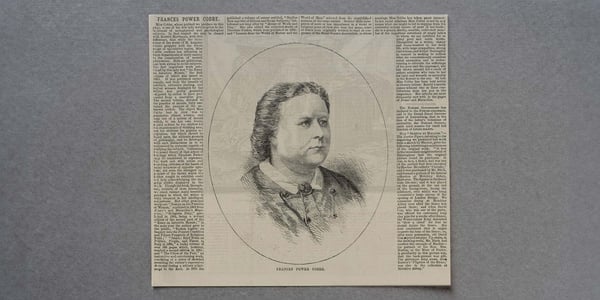You may not always feel like you're in sync with your pet, and that's fine. We've collected all the information we think might help you to reach peak pet parent. Subscribe to get the freshest posts, straight to your inbox.
Index:



Introduction
As June marks Pride month, we’re exploring Frances Power Cobbe’s extraordinary life, focusing not only on her role in the LGBTQ+ community but her passionate advocacy for animal rights. We also delve into her deep love for dogs, which served as a lifelong source of inspiration and shaped her belief in the inherent value of all creatures.
Frances Power Cobbe (4 December 1822 – 5 April 1904) was a pioneering figure of the 19th century who left an indelible mark in the movements of both queer rights and animal welfare. As a writer, philosopher, animal rights activist and leading figure in the women’s suffrage movement, Cobbe fearlessly advocated for the rights of the marginalised, championing equality and compassion despite the challenges of her time.
Why is Cobbe historically and culturally significant?
To understand Cobbe's historical significance, it’s important to take a closer look at her background. Born in 1822, she grew up in a privileged but restrictive Victorian society that granted her access to education.
In the late 1830s, Cobbe became interested in philosophy and set about to cement her ideas in writing through what is now known as the Essay on True Religion. Her father, upset with her views, expelled her from the home where she continued to write and travel around the world. In Italy, she met a community of similar-minded women including Welsh sculptor, Mary Lloyd, who became her partner. In both private letters and published writing, Cobbe referred to Lloyd numerous times as both “husband”, “wife”, and “dear friend”. Clearly unperturbed by her father’s opinion, Cobbe continued to see the world around her differently from most at the time.



Above: Mary Lloyd
Cobbe was an influential figure in the suffrage movement and helped to shape legislation around women’s rights to separate from their husbands. In 1878, her essay Wife-Torture in England helped to influence the passage of the 1878 Matrimonial Causes Act which for the very first time, gave women of violent husbands the right to a legal separation.
Supporting herself by writing, Cobbe became involved in numerous feminist campaigns for the right to vote, for women to study at university on the same terms as men, and for property rights for married women.
During this time she also became increasingly concerned about animal experimentation, also known as vivisection, and began campaigning for its abolishment entirely.
Queerness in Victorian society
Cobbe's life as a woman in the 19th century was marked by resilience and activism. Though she never explicitly identified herself as queer during her lifetime, Cobbe's advocacy for same-sex relationships and her refusal to conform to societal norms of gender and sexuality indicate a strong alignment with queer activism.
Cobbe's advocacy for same-sex relationships took the form of public speaking, writing, and activism. In 1869, she published an article titled "Criminals, Idiots, Women and Minors: Is the Classification Sound?" in which she argued against the criminalisation of homosexuality. This article challenged the prevailing societal norms and legal framework that persecuted same-sex relationships.
However, rigid gender roles and the emphasis on male-dominated relationships made it particularly difficult for lesbians and queer women to exist openly or find recognition for their identities and relationships.
Women's lives during the Victorian era were often constrained by the expectations of femininity, domesticity, and marriage. Therefore, the concept of a self-identified lesbian woman was largely absent from public consciousness. Same-sex romantic relationships between women were rarely acknowledged or understood, and female ‘friendships’, even intimate ones, were typically viewed as innocent and socially acceptable.
Lesbianism was often erased or dismissed as inconceivable within the cultural framework of the time. The concept of female homosexuality was largely absent from public discourse and was not explicitly criminalised in the same way as male homosexuality. However, this lack of legal recognition should not be mistaken for acceptance or tolerance.
Ultimately, how Cobbe would identify in modern terms is speculative, but her contributions to LGBTQ+ rights and her challenging of societal norms make her an influential figure in queer history. Throughout her life, Cobbe's writings and speeches challenged the dominant narratives, fostering acceptance and understanding. Her courage in speaking out laid the foundation for future LGBTQ+ activists, making her an inspiration whose legacy continues to resonate today.
In 1884, Cobbe and her partner, Lloyd, moved to Wales to retire. After Lloyd died in 1896, Cobbe continued to write, publish and campaign. Blanche Atkinson, a friend of Cobbe, wrote of Lloyd’s death, “The sorrow of Miss Lloyd’s death changed the whole aspect of existence for Miss Cobbe. The joy of life had gone. It had been such a friendship as is rarely seen – perfect in love, sympathy, and mutual understand[ing].” Cobbe and Lloyd are buried together in Gwynedd, Wales.
Animal rights activism



Cobbe’s progressive mindset extended beyond human rights, as she developed an unwavering commitment to animal welfare and the belief that all living beings deserved respect and protection.
Cobbe's love for animals and her commitment to their well-being was at the core of her activism. Recognising the interconnectedness of all life forms, she passionately campaigned against animal cruelty and sought legal protections for animals. Cobbe co-founded the National Anti-Vivisection Society, the first organisation dedicated to ending animal experimentation. She believed that animals possessed emotions and consciousness, an idea far ahead of its time. Cobbe's pioneering work laid the groundwork for the animal rights movement we know today.
Cobbe worked tirelessly to change laws that permitted animal cruelty. She advocated for stronger legislation to protect animals from unnecessary harm and suffering, including the regulation of vivisection and the banning of practices such as dog fighting. Believing that education was crucial for adopting compassion for animals she established the Bands of Mercy which aimed to teach children kindness and respect for animals, these kinds of programmes are still very much in use in education curricula around the world.
Cobbe's favourite companions



Above: Cobbe and Lloyd's dog, Hajjin.
Among all animals, dogs held a special place in Cobbe's heart. She cherished the bond between humans and dogs, recognising their loyalty, companionship, and capacity for love. Cobbe's own dogs, such as her beloved spaniel, Trusty, were constant companions throughout her life.
They provided comfort, solace, and inspiration, further solidifying her belief in the interconnectedness of all beings. Her love for dogs played a significant role in shaping her compassion for all animals, driving her to advocate for their rights and well-being.
In a society that often marginalised and isolated individuals who deviated from societal norms, dogs offered Cobbe unwavering friendship and support. They were her constant companions, offering comfort and solace in both her personal and activist endeavours.
Cobbe believed that dogs and their ability to form deep connections with humans epitomised the sentience and emotional complexity of all animals. By highlighting the unique bond between humans and dogs, Cobbe aimed to challenge prevailing societal attitudes that disregarded the emotional lives and rights of animals.
Conclusion
Frances Power Cobbe's legacy and historical status in both the queer and animal rights movements continue to remain inspiring. Her unwavering dedication to equality, both for marginalised communities and animals, exemplifies the transformative power of love and compassion.
Cobbe's love for dogs acted as a catalyst for her broader advocacy, emphasising the intrinsic value of all living creatures. By celebrating Cobbe's contributions, we honour her as a visionary and remind ourselves of the importance of fighting for justice and kindness, regardless of species or sexual orientation.
Whatever Cobbe’s identity, she continued to fight against societal norms that perpetuated inequality and sought to challenge the status quo which has left long-lasting, positive impacts on today’s society.
Waggel x MindOut
To continue our Pride celebrations, we’ve designed an exclusive t-shirt available to buy throughout Pride month. All proceeds from t-shirt sales will be donated directly to MindOut, a charity based in Brighton and Hove. MindOut provides amazing services to LGBTQ+ people around the world including counselling, awareness workshops, peer support, and more. To read more about the incredible work MindOut does, read our blog post here.
Order your limited-edition Waggel x MindOut t-shirt today by visiting Everpress.
Waggel Pet Insurance
Need more help? You're in luck if you're a Waggel Pet Insurance member. Along with our excellent coverage, we offer access to a 24/7 online vet to answer all your sticky questions, especially if you need grooming assistance.
Not a member? Why not get a quote now and cover your furry friend for a range of illnesses, all while enjoying our amazing perks and rewards.
Want more like this?
Get updates from us with helpful info, advice, answers to frequently asked questions and much more.
Index:
Related posts:
Get your quote
Along with our excellent coverage, we offer access to a 24/7 online vet to answer all your sticky questions.





